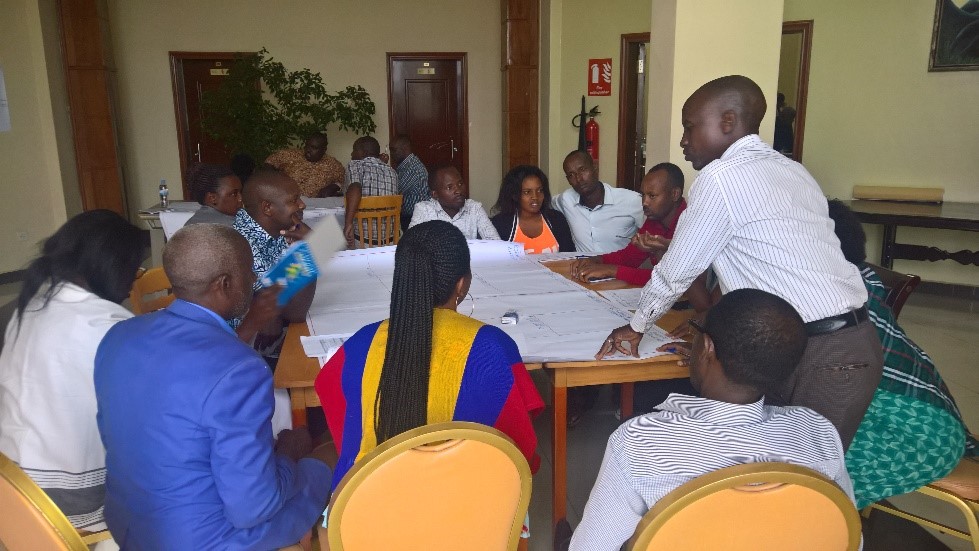For reduced market barriers, diversified enterprise and livelihood opportunities, and increased availability of diverse nutrient-rich foods
What are Bean Business Innovation Platforms?
Bean Business Platforms are vehicles designed to implement program interventions by bringing together diverse and critical actors to improve business ecosystems and incentivize actors in bean corridors. This approach is operationalized through innovation platforms that aim to eliminate bottlenecks in the bean value chain. These innovation platforms are linked to the “Bean Corridor” approach, which is a market-driven model through which CIAT’s Pan-Africa Bean Research Alliance (PABRA) implements research and development activities in Africa.
PABRA has facilitated the establishment of close to 76 business platforms resulting in enhanced business opportunities and increased investments along the bean value chains in member countries. The acceleration of the production is also due to complementary innovations such as structured distribution and consumption hubs. Actors own the process, as they were involved in the design and operationalization of the platform, which provides with an inclusive space for interaction, learning, negotiation, and transaction in a coordinated environment. Platforms had acknowledged the need for all voices and we are seeing an increased number of women and youths in leadership positions.
What challenges does this innovation address?
The innovation addresses the lack of access to good quality seeds, which is the beginning of successful crop production initiatives globally. This is still a formidable challenge for the smallholder farmers especially in the eastern, southern and central Africa where seed systems are still under-developed. The bean business innovation platforms are aimed at addressing this gap. In addition, it also addressing women participation and decision-making processes in accessing agricultural inputs and markets due to cultural norms that restrict women’s mobility and decision making in agricultural activities.
Results achieved through this innovation
Since being launched in 2010, the platforms accompanied by corridor approach method have realised market-driven transformation of rural agriculture at all stages from research and production and distribution of grain to value addition. This platform is driven by lead grain off-takers that provide actors with inclusive spaces for interaction, learning, negotiation, and transactions in a coordinated environment; being mindful of the voices of women and youths. PABRA has facilitated the establishment of close to 76 business platforms (110 women, and 20 youth in leadership positions) resulting in enhanced business opportunities and increased investments along the bean value chains in member countries.
In Zimbabwe, bean business ecosystems have developed around five innovation platforms operating within two bean corridors. The innovation platforms have attracted membership from several enthusiastic partners along the bean value chain led by several private sector actors (seed companies, agro-dealers, aggregators, off-takers, and processors). As a result, about 2,210,000 households sell to profitable markets and about 386,256 households in Zimbabwe were able to access bio-fortified bean varieties from 2015 to 2020. We also saw an increase in women leadership positions to more than 60%.
In Tanzania, some business platforms have been developed around school feeding programmes integrating farmers, schools, district education boards, agro-dealers and off-takers have resulted in nutrient-rich bean varieties reaching over 200 communities around schools.
In Rwanda, the platforms bring together 2 exporters, the commodity exchange, aggregators and 2 bean product processors linking them to 10 platforms established at the district level for supply of 60,000 MT of beans per year. This has also helped in empowering women by increasing their participation and leadership in these activities which is now at 48.6%.
Partners and funders of this Innovation
Through the partnerships of Alliance of Biodiversity International – International Center for Tropical Agriculture (CIAT) and PABRA programmes including SDC funded project “Improving food security, nutrition, incomes, natural resource base and gender equity for better livelihoods of smallholder households in Sub-Saharan Africa”; GAC funded project “Improving Bean Production and Marketing in Africa (IBPMA)”; AfDB funded project “Technologies for African Agricultural Transformation (TAAT)” program, been business innovation platforms have been at the heart of discussion between the involved next-users of these projects. The strong partnerships that have contextualised the bean innovation platforms continue to enhance bean businesses and improved nutrition.
Next steps to scale this Innovation
The results of these platforms have permitted farmers to access market easily with their better seeds and improved nutrient-rich bean varieties. This is helping increase demand as consumers buy more nutrient-rich foods, thereby increasing their well-being. The flow between supply and demand and the enhanced quality of the product helps improve the business environment and increased interest from policy makers to invest in this innovation to increase the income of actors along the value chain. The experiences demonstrate that scaling of promising technologies require systematic facilitation. Linkages with private sector, leveraging national programs, and engagement with communities through the innovation platforms proved the key to success. Increased partnerships will help develop even more the innovation platforms as they are based on linkages/synergies between actors. There are still efforts to be made in terms of access to support services such as insurance to the production, legal and financial skills to farmers. Strengthening the relation between farmer organisations and private sectors (inputs dealer, micro financing institution, traders etc.) requires continued capacity building of rural producer organizations where the stakeholders are provided with different interlinked roles on bean production, and insurance against crop failure among others.
Authors: Victoria Clarke and Ramya Kulkarni (CRP-GLDC MEL Team).
References:
- Njingulula et al. 2014. Strengthening local seed systems within the bean value chain: Experience of agricultural innovation platforms in the Democratic Republic of Congo. African Crop; Science Journal. Vol. 22. https://www.ajol.info/index.php/acsj/article/view/108569
- https://taat-africa.org/the-use-of-business-platform-approach-boosts-access-to-high-iron-beans-in-zimbabwe/
- https://www.pabra-africa.org/empowering-women-take-leadership-roles-bean-business-platforms-rwanda/
- https://www.ipabp.org/innovation-platform/Masaka-Bean-Innovation-Platform/
Acknowledgement: This work was undertaken as part of, and funded by the CGIAR Research Program on Grain Legumes and Dryland Cereals (CRP-GLDC) and supported by CGIAR Fund Donors.
This blog was first published on http://gldc.cgiar.org/

